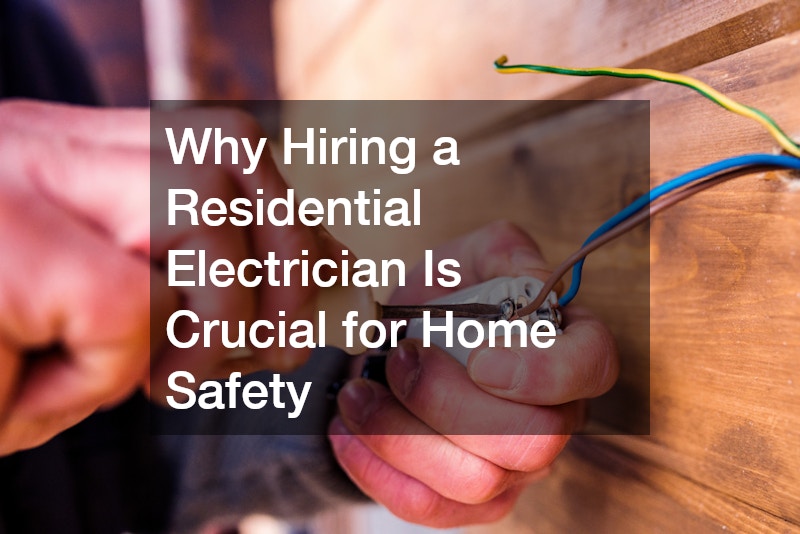A licensed residential electrician plays a vital role in keeping your home safe, functional and compliant with Australian electrical standards. While it can be tempting to tackle small electrical tasks yourself, improper wiring or faulty installations can lead to serious hazards, including electric shocks, fires and costly repairs.
Hiring a qualified professional ensures that all electrical work is completed safely and correctly.
Electricians are trained to handle complex systems, assess risks and provide solutions that meet legal and safety requirements. Whether you are renovating, building or maintaining your property, relying on a residential electrician is not just recommended—it is essential.
Understanding the Scope of a Residential Electrician
A residential electrician specialises in electrical systems found in homes, apartments and small residential buildings. Their work includes installing wiring, lighting, power outlets, switchboards and safety switches. They also diagnose faults, upgrade existing systems and ensure everything complies with current regulations.
Unlike commercial electricians who handle large-scale industrial sites, residential electricians focus on household electrical needs. This means they are well-versed in the unique requirements of domestic living spaces, from kitchen appliances to outdoor lighting.
Whether you are building a new home or simply updating your lighting, a residential electrician ensures the job is done efficiently and according to code.
Preventing Fire Hazards and Electrical Failures
Faulty wiring and overloaded circuits are among the leading causes of house fires in Australia. Many older homes were not built to accommodate the growing number of electrical appliances we use today. Outdated systems can overheat or short-circuit, putting your household at risk.
A residential electrician can inspect your electrical system to identify potential fire hazards. They may recommend upgrading your switchboard, installing additional power points or rewiring parts of the home. These preventative measures reduce the likelihood of dangerous incidents and extend the lifespan of your electrical system.
Safety switches, which cut power instantly during a fault, are another important feature. A licensed electrician ensures these devices are installed and functioning properly.
Legal and Compliance Requirements
In Australia, electrical work must meet strict legal and compliance standards. This includes following the Wiring Rules (AS/NZS 3000), obtaining the right permits and ensuring all installations are certified.
Doing electrical work without proper training is not only dangerous—it is illegal. Homeowners who attempt DIY wiring or hire unlicensed individuals risk voiding their insurance, receiving heavy fines or causing harm to themselves and others.
A qualified residential electrician is licensed, insured and trained in local regulations. They will issue a Certificate of Compliance upon completion, giving you peace of mind that the work meets all legal requirements.
Energy Efficiency and Cost Savings
Modern households are increasingly focused on energy efficiency and reducing power bills. A residential electrician can help you achieve these goals by recommending and installing energy-saving solutions such as LED lighting, smart home systems and solar-ready wiring.
They can also assess your current energy usage and suggest changes to reduce consumption. For example, switching to energy-efficient appliances or upgrading outdated wiring can lower your electricity bills and make your home more environmentally friendly.
Proper installation also prevents waste. Poorly connected appliances or inefficient systems can draw more power than necessary, leading to higher costs over time.
Supporting Renovations and Upgrades
If you are planning a home renovation, hiring a residential electrician early in the process is crucial. They work closely with builders, plumbers and other trades to ensure your electrical layout supports your lifestyle and complies with building codes.
From installing modern lighting designs to adding extra power points and smart home features, electricians make sure your home is functional and future-ready. They also coordinate with energy providers when upgrading switchboards or connecting new circuits.
Trying to make electrical changes after a renovation has started can lead to delays, rework and unexpected costs. Having an electrician involved from the start keeps your project running smoothly.
Emergency Electrical Services
Power outages, sparking outlets and electrical smells are signs that something is wrong. In these situations, you need immediate help from a licensed residential electrician.
Many electricians offer emergency services to respond quickly to urgent problems. They can identify the source of the issue and restore your power safely, avoiding further damage or risk.
Attempting to fix emergency issues yourself can be extremely dangerous. Trained electricians have the tools and knowledge to manage these situations without putting you or your property in harm’s way.
Hiring a professional residential electrician is one of the most important steps you can take to protect your home and family. From ensuring legal compliance to preventing fire hazards and supporting energy efficiency, their expertise is essential for any electrical work.
Whether you are upgrading your lighting, renovating your kitchen or responding to an emergency, having a trusted electrician on your side makes all the difference. They not only perform high-quality installations and repairs but also offer peace of mind.
Investing in professional electrical services ensures your home remains safe, efficient and ready for the demands of modern living.

